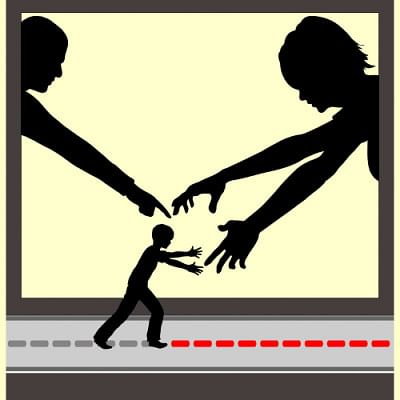Parental overprotection: Why is it not questioned?

The policy of protectionism is loosely referred to as the policy where an entity of higher authority, whether it is a guardian or the government of a state, closely monitors and controls another entity.
What I, as a young adult, am interested to discuss, is the protectionism that occurs on a smaller scale. That is, within the household only. And within a household, the guardians would often be the parent(s), since if any grandparents were to live in the common South Asian household, it is more likely that they would relinquish the responsibility to their kin. And the children are too young or inexperienced to take major decisions yet.
Now the relationship between parents and their children is no doubt sophisticated and rather complicated. Parents undoubtedly have far more experience about the world than their children. But what I would like to point out is the level of control parents exert upon their children. There is a reason why stereotypes exist about South Asian parents being overly strict and excessively involved in their children's lives: that is because this stereotype is generally true.
Parents in South Asian middle-and-higher-income households tend to be very much involved in their children's lives for a very long time, often up to their children's late-20s. This involvement can sometimes be based on the notion that their children have not grown up. Some parents often take it to the extreme of micromanaging every move their children make and have significant control over the decisions of their children.
That does not mean that parental involvement in a child's life is a bad thing. There is no doubt that children need someone to give them several nudges in the right direction, someone to teach them about the outside world, and someone to nurture them until they grow up to become functional adults. And their parents are the ones who are supposed to fulfil that role. Children who have absent parents can suffer from a poor upbringing. However, there is a difference between being there for your children when they need you, and being an overbearing presence above your children.
Much like the drawback of protectionism where local firms are unable to cope with the new competitive environment once the government suddenly opens the market up to the world, the children know very little of what to do once they "leave the nest", because every decision that they were supposed to make by themselves, were often made for them by their guardians.
While the young adults that leave their nests are not oblivious, they tend to suffer from indecisiveness—often they cannot decide for themselves what to do with their lives after they venture out to live on their own. And this sometimes creates bitterness and leads them to develop mental health issues because of certain dissatisfaction, stress, unfulfilled desires, etc.
Despite how much the problem of parental protectionism sounds like the ramblings of a first-world problem, it still exists in the third world. This does not eliminate the fact that there are many children born into strife and poverty, and survival is a bigger priority than having a fulfilling life to look forward to.
But returning to parental protectionism, sometimes the overshadowing presence of the parents or guardians over a child, teen, or even a young adult can be so overwhelming, that it may borders on abuse. Such as in the case where parents expect their views to be treated as the gospel truth by their children, and to be followed as such. And if those views are not followed accordingly, and expectations are not matched, their children are belittled to the extent that they suffer having a dangerously low self-esteem throughout their lives and are incredibly susceptible to self-harm.
Sadly, parents often resort to such over-controlling behaviour thinking that they are doing the best for their children, without realising how they are stifling their child in the process. Most parents do not even know that they are suffocating their children with their own rules and expectations, and are actually pushing their children away.
Parenting is no easy task. Taking the decision to bring another human being into the world and taking up the responsibility to nurture that infant into a functioning and healthy adult is nothing short of a monumental task. The dedication and sheer willpower needed to properly raise a child is immense. However, all that effort could go in vain if the upbringing eventually ends up with the child growing up into an indecisive young adult who finds him/herself to be incapable of taking major decisions every now and then.
Being frank with one's children and expecting the same frankness from their side would be a good start. Instead of pushing ideologies onto them, parents should try to know their views once they are old enough to have their own philosophies. Listen and act accordingly. If something they believe seem wrong, explain to them why that is instead of talking down to them.
Protecting your children from the evils of the world is a necessity, but try not to make them think that they cannot tackle those evils themselves. Do not fall into the stereotype of South Asian parents.
Araf Momen Aka is an undergraduate student of Jahangirnagar University.

 For all latest news, follow The Daily Star's Google News channel.
For all latest news, follow The Daily Star's Google News channel. 



Comments